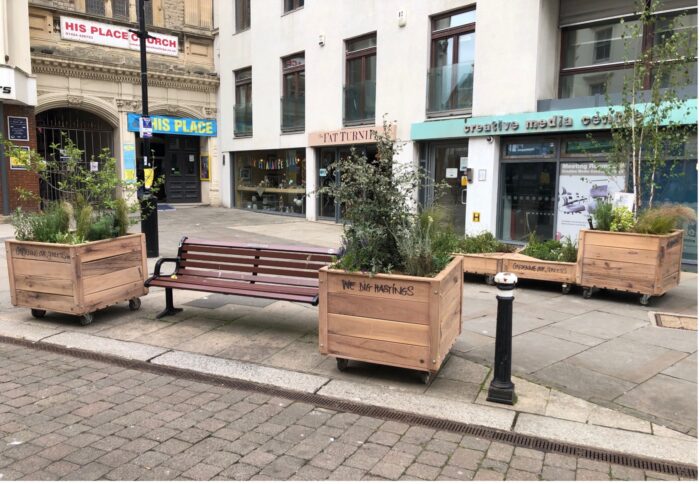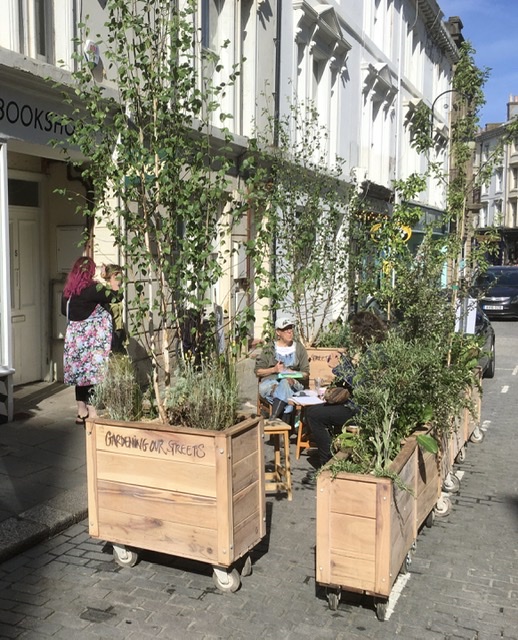As one of the most under-served communities in the South East, Hastings is no stranger to promises of transformative funding from central government. But campaigners hope the community involvement and strong green element mean the new Hastings Town Deal will be different. This blog by Thalia Griffiths looks at their plans.
Transition Town Hastings (TTH), working collaboratively with both borough and county councils, is working to secure funding from the $25m Hastings Town Deal, for the first phase of a programme to ensure that the town’s economic transformation takes place along sustainable principles, including creating the South East’s first green Garden Town.
Despite its quaint Old Town and seafront attractions, Hastings ranks high on the Ministry of Housing, Communities and Local Government’s English indices of multiple deprivation. A succession of headline spending packages over the years have failed to deliver lasting change but TTH is hopeful that a renewed focus on valuing community participation may help foster improved wellbeing and civic pride.
“The Garden Town initiative is taking a qualitatively different approach because it’s a community-led idea,” said former TTH chair Sherry Clark. Since the Hastings Town Deal’s initial call for submissions from community projects in 2020, Garden Town team members have worked to create more of an integrated partnership, advocating for local people to contribute as equal participants in the programme development, instead of leaving control in the hands of statutory local authorities.

Past interventions have often overlooked the transformative potential of green surroundings but the new Hastings Town Deal gives a central role to its green element as a means to attract investment and visitors. East Sussex College will create a Green Technology Centre of Excellence providing training and learning programmes focused on the green economy. The overall plan, which includes redeveloping Hastings’ Norman castle as a major visitor attraction, is ambitious, but for their part of it, TTH are starting with small but visible steps to move the focus from vehicles to people and create more green spaces.
Gardening Our Streets is a community-led initiative to plant and tend a series of pop-up “parklets” and garden spaces to show how much difference a little green might make to the busy and car-dominated town centre. Parklets, which have been hugely successfully since lockdown in cities such as Bath, extend and green parking spaces and pavements with planters and features such as seating, proving that urban nature-based initiatives don’t need to take up a lot of space to have an impact.
Gardening Our Streets held two planting workshops on 19 and 21 May, where participants filled 18 hand-made oak planters with hardy seaside plants. A call went out for volunteers, who included A Band of Brothers young men’s group, Holy Trinity Church, Groundwork South and the Hastings Rough Sleepers Initiative. The initiative is being coordinated by TTH, with advice from Great Dixter head gardener Fergus Garrett, local landscape architect Julia Hilton, and local horticulturalists Nicole Collomb and Abby Riddihough.
TTH already has a community garden and wildflower path at St Leonards Warrior Square station, as well as four community composting hubs, but Gardening Our Streets is a much bigger undertaking, one where organisers have found themselves tackling challenges like manoeuvring seven one-tonne bags of soil and £3,000 worth of plants into a narrow alley. The planters are just the first phase of the ambitious Garden Town programme, which takes as its inspiration Sheffield city centre’s transformational Grey to Green scheme.
Hastings Garden Town envisions Havelock Road, which runs from the rail station to the seafront, as a biodiverse greening and flood prevention urban garden, with green arteries that connect the town centre to its parks, seafront and countryside.

Initial funding for the project came from the Trinity Triangle/America Ground Heritage Action Zone, that paid for a community consultation in Trinity Street in June 2021, as well as the 16 wheeled oak planters, emblazoned with ‘Gardening Our Streets’ and ‘We Dig Hastings’. Additional financial support for community participation has come from Sussex Community Development Foundation’s Asset-Based Community Development programme, Making It Happen.
The short-term aim is to extend the greening to join up local spots like pocket parks and community orchards to create greener, safer arteries through the town. The initiative also includes the launch of We Dig Hastings, an innovative gardening ‘time bank’ enabling volunteers to exchange the time they give to Gardening Our Streets for anything from coffee and cake at a local café to trips to inspirational local gardens like Great Dixter.
TTH says time-banking isn’t so much about formal volunteering as about creating connections and caring about common ground. Time-banks are a way to recognise and acknowledge the value of informal caring and community work that might not be possible otherwise. One key feature of a time-bank is that the time-credits participants get for taking part are transferable — they can be gifted so another person can benefit from them.
“It’s not about ‘Build Back Better’, we’re trying to create something completely new,” Sherry said. “It’s about building forward differently, by recognising and valuing the contributions local people are making to improving the town centre.”
Originally posted at https://seclimatealliance.uk/hastings-hopes-to-be-south-easts-first-garden-town/ by Thalia Griffiths, South East Climate Action


Leave a Reply